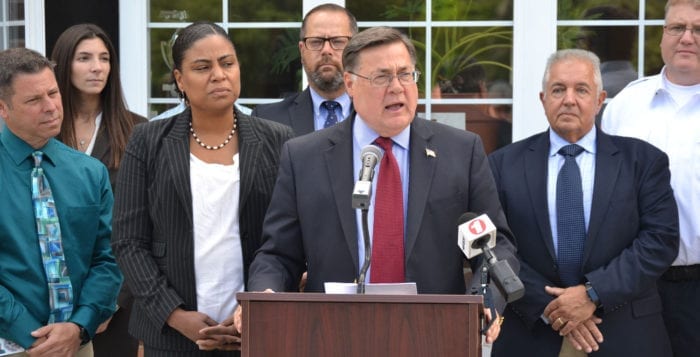Off-campus housing riddled with town code violations and unsafe conditions for Stony Brook University students has plagued Three Village residents for years. In 2013, the situation inspired community residents Bruce Sander and Anthony DeRosa to start the nonprofit organization Stony Brook Concerned Homeowners.
Coordinated with the start of a new school year, Brookhaven Town Supervisor Ed Romaine (R) delivered a clear message to landlords who rent to university students within his jurisdiction during a press conference Sept. 8: follow town building and fire safety codes or face consequences. The town and university presented a united front from Stony Brook Fire Department Sub Station 2 and stated their intentions to ensure students who reside in off-campus housing are safe in homes that meet town and state codes.
“We have codes for a reason — to protect health and safety,” Romaine said. “We are going to protect the health and safety of the students.”
The supervisor said many of the illegal rooming houses where students live have been subdivided into as many as 10 bedrooms, and a home on Christian Avenue, which he called the “showpiece” of illegal homes, had at least 16 occupants. Romaine said the house is now in foreclosure.
Brookhaven Councilwoman Valerie Cartright (D-Port Jefferson Station) said it is important that renters in the town know their rights when dealing with landlords, and she said town officials are available to assist renters who feel they are in an unsafe situation.
“The supervisor and I cosponsored a number of resolutions over the years to improve the quality of life of residents and to improve the safety of the residents renting here in the Town of Brookhaven,” she said. “Over the past two years or so we have a had a number of roundtable discussions with Stony Brook University, the supervisor’s office, Stony Brook Concerned Homeowners, and of course, our law department and planning department, to make sure we are addressing this issue, as it is a very important issue in our community.”

Deputy Town Attorney Dave Moran said there has been an increase in foreclosures in the community not due to financial reasons but due to the enforcement of building codes.
“We have broken [landlords’] business models in some circumstances, where it is no longer profitable for them to own their second and third house and collect those thousands in rents, by enforcing the statutes that we’ve put in place, by monitoring the rental permits and complaints that come in,” Moran said.
Moran said the town has collected $211,000 in fines over the last month for building violations, compared to only $300,000 collected for the entire year in 2008.
He said partnering with the university, which has educated students on their rights, has helped in uncovering issues as more students are contacting the town to report violations by their landlords.
Judith Greiman, chief deputy to the president of Stony Brook University and senior vice president for government and community relations, said the university has the most beds of any SUNY campus and are second among all universities in the state. The university added 759 new beds this past year with the opening of Chavez and Tubman residence halls and an additional 173 new beds will be available in the fall of 2018.
The chief deputy said the university has taken great steps to ensure students’ safety thanks to the input received from the community and support Romaine, Cartright, Brookhaven Town code inspectors and others have provided.
Among measures the university has undertaken since March 2013 are prohibiting advertisements of off-campus rentals on SBU’s website, unless the landlord can provide a Brookhaven Town rental permit, and prohibiting posting on campus bulletin boards. The university also holds tenants’ rights workshops to help students understand what to look for when renting.
Sander was on hand for the conference representing the Stony Brook Concerned Homeowners organization, and he commended the town and the university for their efforts.
“Unfortunately there will always be those landlords who still believe in the secret method of evading the laws and endangering the students and their community,” Sander said. “I’d like to send a message to the housing landlords: obey the laws.”
The organization founder said there should be no more than four people in a home. He said landlords can also do their part by maintaining their property, mowing grass weekly and providing garbage cans and enough parking space in driveways for tenants.
When it comes to circumventing the law, Romaine had a warning for landlords.
“Don’t do it, we’re coming for you,” he said.
Additional reporting by Alex Petroski






